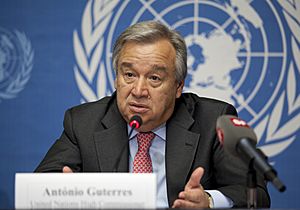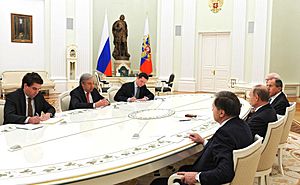António Guterres facts for kids
Quick facts for kids
António Guterres
GCC GCL
|
|
|---|---|
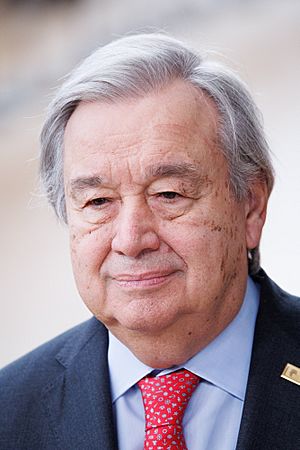
Guterres in 2023
|
|
| 9th Secretary-General of the United Nations | |
| Assumed office 1 January 2017 |
|
| Deputy | Amina J. Mohammed |
| Preceded by | Ban Ki-moon |
| 113th Prime Minister of Portugal | |
| In office 28 October 1995 – 6 April 2002 |
|
| President | |
| Preceded by | Aníbal Cavaco Silva |
| Succeeded by | José Manuel Barroso |
| United Nations High Commissioner for Refugees | |
| In office 15 June 2005 – 31 December 2015 |
|
| Secretary-General | |
| Preceded by | Ruud Lubbers |
| Succeeded by | Filippo Grandi |
| President of the Socialist International | |
| In office 10 November 1999 – 15 June 2005 |
|
| Secretary-General | Luis Ayala |
| Preceded by | Pierre Mauroy |
| Succeeded by | George Papandreou |
| Secretary-General of the Socialist Party | |
| In office 23 February 1992 – 21 January 2002 |
|
| President | António de Almeida Santos |
| Preceded by | Jorge Sampaio |
| Succeeded by | Eduardo Ferro Rodrigues |
| Leader of the Opposition | |
| In office 23 February 1992 – 28 October 1995 |
|
| Prime Minister | Aníbal Cavaco Silva |
| Preceded by | Jorge Sampaio |
| Succeeded by | Fernando Nogueira |
| Member of the Assembly of the Republic | |
| In office 3 June 1976 – 4 April 2002 |
|
| Constituency | Castelo Branco |
| Personal details | |
| Born |
António Manuel de Oliveira Guterres
30 April 1949 Parede, Cascais, Portugal |
| Citizenship |
|
| Political party | Socialist |
| Spouses |
|
| Children | 2 |
| Alma mater | Instituto Superior Técnico, University of Lisbon |
| Signature | |
António Manuel de Oliveira Guterres (born 30 April 1949) is a Portuguese politician and diplomat. He is currently the ninth Secretary-General of the United Nations, a role he has held since 2017. Before this important job, Guterres was the Prime Minister of Portugal from 1995 to 2002. He is a member of the Portuguese Socialist Party.
Guterres led the Socialist Party from 1992 to 2002. He became prime minister in 1995. He resigned in 2002 after his party lost local elections. Even after this, many people in Portugal still thought he was one of the best prime ministers of the last 30 years.
He also served as President of the Socialist International from 1999 to 2005. From 2005 to 2015, he was the United Nations High Commissioner for Refugees. In October 2016, Guterres was chosen to be the UN Secretary-General. He took office in January 2017, becoming the first European to hold this position since 1981.
Contents
Early Life and Education
António Manuel de Oliveira Guterres was born on 30 April 1949, in Parede, Portugal. He was a very bright student. In 1965, he won a national award for being the best student in the country.
He studied physics and electrical engineering at Instituto Superior Técnico in Lisbon. After graduating in 1971, he worked as a professor teaching systems and telecommunications. Later, he decided to leave his academic career to focus on politics.
Political Journey
Guterres's political career began in 1974 when he joined the Socialist Party. This was shortly after the Carnation Revolution in Portugal, which ended a long dictatorship. He quickly became involved in the party's leadership.
He served as a member of the Portuguese Parliament for many years, from 1976 to 2002. He also led the Socialist Party's group in Parliament from 1989 to 1990. Guterres was part of the team that helped Portugal join the European Union in the late 1970s. He also helped start the Portuguese Refugee Council in 1991.
In 1992, Guterres became the leader of the Socialist Party and the leader of the opposition. He was also chosen as one of the vice presidents of the Socialist International, a worldwide organization of socialist parties.
Prime Minister of Portugal
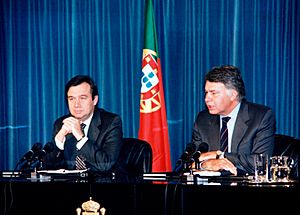
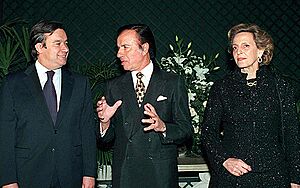
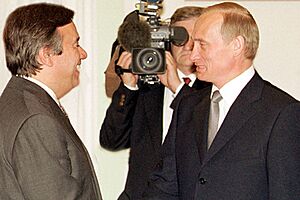
In 1995, the Socialist Party won the parliamentary election, and António Guterres became the Prime Minister of Portugal. He promised to manage the country's budget carefully and improve the economy. He also focused on increasing jobs, improving tax collection, and investing more in education.
During his time as prime minister, many changes were made in areas like education, housing, social welfare, and healthcare. Portugal's economy was growing, which helped his government reduce debt and increase spending on social programs.
In 1998, Guterres oversaw Expo 98 in Lisbon, a big international exhibition. His government also held two nationwide votes (referendums) in 1998.
On foreign policy, Guterres pushed for the United Nations to help East Timor in 1999. East Timor had been badly damaged after voting for independence. He also completed the process of returning Macau, a former Portuguese colony, to Chinese control in 1999.
His second term as prime minister, starting in 1999, faced more challenges, including economic slowdowns. However, some important laws were passed, such as the the legalization of same-sex civil unions in 2001.
In December 2001, Guterres resigned after his party lost local elections. He wanted to prevent the country from facing more political problems.
Leading the Socialist International
Guterres was elected president of the Socialist International in November 1999. He held this position until June 2005. This role allowed him to work with socialist and social democratic parties from around the world.
Diplomatic Career
In May 2005, Guterres was chosen to be the United Nations High Commissioner for Refugees (UNHCR). This was a very important role, leading one of the world's largest humanitarian organizations.
High Commissioner for Refugees
As High Commissioner, Guterres managed a huge team of over 10,000 staff in 126 countries. They helped more than 60 million refugees and displaced people. During his time, he made big changes to the UNHCR, making it more efficient and better at responding to emergencies.
He spoke out about the challenges faced by refugees, especially during the Syrian civil war. He called the refugee crisis "existential" for countries hosting refugees and asked for more international help. He also pushed for European countries to have a more organized and kind approach to the refugee crisis in the Mediterranean Sea.
In 2012, Guterres appointed actress Angelina Jolie as his special envoy to represent the UNHCR. They visited refugee camps and spoke together at the United Nations Security Council to raise awareness.
Guterres left his role as High Commissioner on 31 December 2015. He had served the second-longest term in the organization's history.
United Nations Secretary-General
Becoming Secretary-General
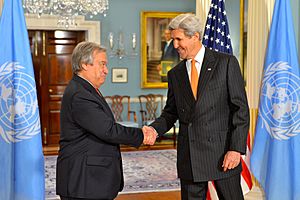
Guterres officially became the United Nations Secretary-General on 1 January 2017. He was formally elected by the United Nations General Assembly on 13 October 2016.
In February 2016, Guterres put his name forward as Portugal's candidate for the role. This was the first time candidates had to present their plans in public hearings at the UN. Guterres impressed many during these hearings.
On 5 October, the United Nations Security Council decided to nominate him. A week later, the General Assembly officially elected him. Guterres is the first former national leader to become the UN Secretary-General.
First Term as Secretary-General
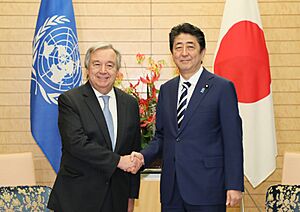
On his first day, Guterres promised to make 2017 a year for peace. He said, "Let us resolve to put peace first." He also warned the United States that if it pulled back from international issues, other countries would step in.
Guterres expressed sadness over the death of Chinese Nobel Peace Prize winner Liu Xiaobo, who died while in government custody. He also called for a solution in Catalonia to be found within Spain's laws.
He criticized the Saudi Arabian-led intervention in Yemen, calling it a "stupid war" that harmed the people of Yemen. Guterres also disagreed with the U.S. decision to recognize Jerusalem as Israel's capital. In March 2018, he described the situation in Syria's Eastern Ghouta as "hell on earth" due to widespread damage.
Guterres called the 2018 meeting between North Korea and the United States a "crucial milestone" for nuclear disarmament. He urged both sides to work towards dismantling North Korea's nuclear weapons program. In August 2018, he called for an investigation into an air strike in Yemen that killed many civilians, including children.
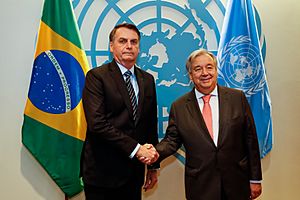
Guterres condemned the persecution of the Rohingya Muslim minority in Myanmar. He also became the first Secretary-General to say that new technology would greatly change jobs. He suggested stronger safety nets, like Universal Basic Income. In 2019, some human rights groups criticized him for being quiet about China's treatment of Uyghurs.
In June 2019, Guterres stated that the UN must lead the fight against climate change. He also condemned Israeli plans to take over parts of the West Bank. In 2020, he received the Theodor Herzl Prize for being a friend to the Jewish people and Israel.
He welcomed peace agreements between Israel and the United Arab Emirates, and between Israel and Sudan. In August 2020, he expressed support for people in Lebanon after a large explosion in Beirut. In September 2020, he called for global unity to fight COVID-19 and asked for a worldwide ceasefire. He also expressed concern about fighting in Nagorno-Karabakh.
Second Term as Secretary-General
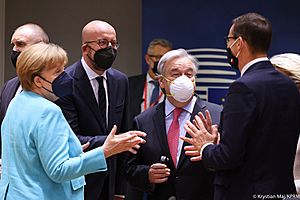
On 18 June 2021, Guterres was appointed for a second term as Secretary-General by the United Nations General Assembly.
In July 2021, Guterres said it would be good to make "ecocide" (destroying the environment) a crime at the International Criminal Court.
In April 2022, Guterres visited Ukraine during the Russian invasion of Ukraine. He was surprised when parts of Kyiv were shelled while he was there. He also helped arrange the evacuation of civilians from the Azovstal Iron and Steel Works in Mariupol. He stressed the importance of moving towards a renewable energy future.
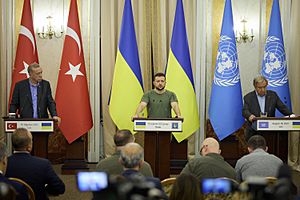
In May 2022, Guterres toured West Africa, meeting families affected by conflict and pushing for African peace efforts. On 22 July 2022, the UN, led by Guterres, helped broker a deal between Russia and Ukraine to allow grain exports from Ukrainian ports.
In November 2022, Guterres met with the Ethiopian Prime Minister. He praised the ceasefire that ended the two-year Tigray War, noting it had caused many casualties.
In January 2023, Guterres called for a global effort to improve education. He urged countries to create inclusive learning environments and end laws that prevent access to education.
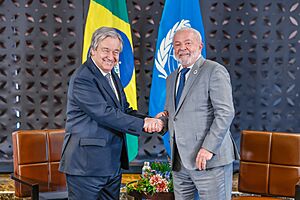
In May 2023, Guterres stated that peace talks to end the Russo-Ukrainian War were "not possible at this moment." He said both Russia and Ukraine believed they could win the war.
In July 2023, Guterres suggested creating an international group to oversee artificial intelligence. He warned that AI has huge potential for both good and bad, and that there are "potentially catastrophic and existential risks" ahead. He believes the UN can help set rules and coordinate internationally.
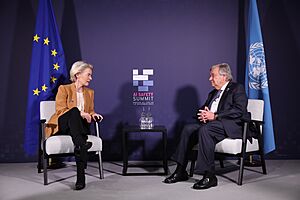
Guterres condemned the actions of Hamas during the Gaza war but also expressed deep concern about Israel's blockade of the Gaza Strip. He called for a ceasefire and said he was "shocked by the misrepresentations" of his statements, clarifying that he also condemned Hamas's attacks.
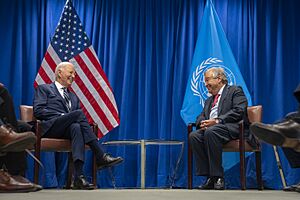
In February 2024, Guterres called for a full investigation into the death of Russian opposition activist Alexei Navalny.
In August 2024, Guterres was given East-Timorese citizenship for his work on the country's independence. This made him the first UN Secretary-General to hold dual citizenship.
In October 2024, Israel's Foreign Minister declared Guterres unwelcome in Israel after his statements about the October 2024 Iranian strikes against Israel. Guterres later condemned the Iranian strikes.
On 24 October 2024, Guterres attended the 16th BRICS summit in Russia. He called for a "just peace" in Ukraine that follows UN rules. Ukrainian President Volodymyr Zelenskyy refused to meet with Guterres in Kyiv after this, criticizing his meeting with Russian President Vladimir Putin.
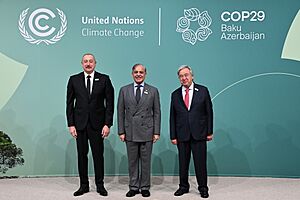
In December 2024, Guterres said he wants the African Union to have a permanent seat on the UN Security Council to bring more fairness to African countries.
On 25 January 2025, Guterres asked Rwanda to remove its troops from the Democratic Republic of the Congo and stop supporting rebels.
On 18 March 2025, Guterres said he was "shocked" by Israeli attacks on the Gaza Strip that killed many civilians. He called for a ceasefire, humanitarian aid, and the release of hostages.
On 22 June 2025, Guterres described U.S. strikes on Iranian nuclear sites as a "dangerous escalation" and called for diplomacy.
Other Activities
António Guterres has been involved in many other important groups and organizations:
- He is the chairman of the Honorary Advisory Council for the Dag Hammarskjöld Fund for journalists.
- He was an advisor to the board of Caixa Geral de Depósitos from 2003 to 2005.
- He is a member of the Club of Madrid, a group of former democratic presidents and prime ministers.
- He is also a member of the European Council on Foreign Relations (ECFR).
- He is a member of International Gender Champions (IGC), which promotes gender equality.
- He was a non-executive member of the board of trustees for the Calouste Gulbenkian Foundation from 2013 to 2018.
- He was part of the Global Agenda Council on Humanitarian Assistance for the World Economic Forum from 2008 to 2009.
Personal Life
In 1972, Guterres married Luísa Amélia Guimarães e Melo. They had two children, Pedro and Mariana. Luísa passed away in 1998.
In 2001, Guterres married Catarina Vaz Pinto, who had been a state secretary for culture in Portugal.
Besides his native Portuguese, Guterres also speaks English, French, and Spanish. He is a practicing Catholic.
Images for kids
See also
 In Spanish: António Guterres para niños
In Spanish: António Guterres para niños
 | Madam C. J. Walker |
 | Janet Emerson Bashen |
 | Annie Turnbo Malone |
 | Maggie L. Walker |


